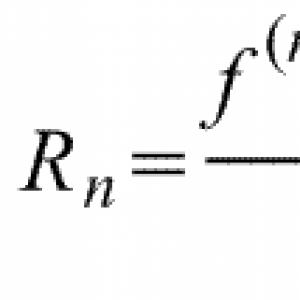Exemplary essays in the direction of "purpose and means". What goal brings satisfaction? Does achieving a goal always make a person happy? How to set a goal so that you don't get disappointed later
We constantly set ourselves certain goals, and dream about what will happen when we achieve them. But the path from a dream to a result can be difficult. Sometimes laziness interferes, sometimes fear. It often happens that enthusiasm passes and we enter a state of rest, allowing the dream to remain a dream. About,how to achieve your goal without stopping at anything, read in this article.
Clearly state the goal
To begin with, it is important to clearly understand what you want to achieve and in what time frame. Plans, of course, can be adjusted, but they must be specific, not vague, then it is much easier to pave the right path to their implementation. This is the first thing you need to know when figuring out how to achieve a goal. So what do you want? Say it now.
Motivation
The main thing that will become the “fuel” for your movement forward is motivation. You must really really want something, feel like a dream and do not forget to regularly evoke this feeling in yourself so that the desire does not disappear. Here you need to understand that the more you want, the faster you will learn how to achieve your goals and the faster you will achieve. Therefore, think about what you will get as a result? Do you want this? Make it so that there is a shiver of anticipation of what you want.
Break the goal into several small tasks
Sometimes your “wishlist” can make your head spin - how to achieve everything? It's so much work! From such thoughts, hands can fall and enthusiasm disappears. Therefore, in order not to lose interest in achieving the goal, break it down into several stages, smaller tasks that need to be solved. It is much easier to achieve each individual stage and this brings you closer to main goal. And you will see your progress, which will add significantly. For example, if you want a perfect figure, then your task for today is to choose a gym where you will go to practice. Buy a subscription tomorrow. Simple tasks, but each of them is a step towards your dream.
The key is to take the first step.
This is simply phenomenal in its effectiveness. If you want to know how to achieve your goal, just take the first step. When you think about all the work that you need to do today, you immediately want to hit your head against the wall, laziness turns on and there are hundreds of reasons to do nothing or postpone things until tomorrow. But if you focus on the fact that you only need to do a small thing, "only 5 minutes of work", then it is quite possible to force yourself. And then get involved and the work will go by itself. Therefore, focus on the beginning of work, appetite comes with food.
Be confident in yourself - this is a real magnet! It will always attract people to you! Donald Trump.
Write down your goals every day
It is very useful to write down tasks for the next day in a notebook. Let it be a few points, but they are clearly formulated and you have set a goal for yourself. You start thinking about it, focusing on the solution, and your conscience and dignity will push you forward. No one wants to look like a weakling in their own eyes, who is not able to do those things that he himself recognized as important. This effect is achieved precisely thanks to a clearly formulated and written task.
Don't wait for 100% completion
Many are waiting for the right moment to take action. But the truth is that there are no ideal conditions, you will always be either tired or you will not have the right tool at hand. So don't wait for the right moment, it's already here. Every moment is a chance to take a step forward.

Always think
You must always keep in mind the way to achieve your goal. If all the time to think in the right direction and analyze necessary information, then you tune in to your wave and soon begin to notice that thoughts come to your mind that you didn’t suspect before. It will be a way to solve problems that may have seemed unsolvable. Therefore, connect your head more often.
Discipline
This is perhaps the main factor that will help you solve any problems. We often find ourselves justifying why today we need to rest, or do a little less, but you just have to force yourself. It is not your mind or skills that will be decisive, but willpower. If you can break the task into certain stages and every day disciplinedly, even “I can’t through it”, do everything necessary, hit one point, then you will definitely succeed.
You will succeed if you do not stop halfway .Konosuke Matsushita
Don't slow down
If you want to know how to achieve your goal - do not slow down! There are always chances to achieve the desired result, and it is important to use them, and not wait for the right moment. If the right bus pulls up to you, jump into it, the next one does not know when it will appear and whether it will appear at all. So don't slow down!
Ignore criticism
If you manage to calmly relate to constructive criticism, this is good, but if criticism can upset you and knock you off the rhythm, then protect yourself from it. In any case, the assessment of the other person will not be absolutely correct in relation to your situation, it is always subjective. You yourself will be able to evaluate your work and your plans better than anyone else. Therefore, do not listen to anyone, build your dream.
Learn from the experience of others
If you want to find effective method how to achieve your goals, then look around, because no one has canceled the importance of studying someone else's experience. This will allow you to be inspired by the successes of other people. After all, they are not smarter than you, but they were able to achieve the desired result. In addition, you will be able to avoid the mistakes that they made along the way. Listen to sensible advice, but always think about how these they suit you personally.
Do what you really enjoy
This is the key to success. Often, to achieve a goal, you have to work hard and study absolutely everything related to your business. Such a load is not easy to withstand, but the pleasure that you get when you do what you love gives strength. Therefore, sincere interest is very important for achieving the goal.
Here we figured outhow to achieve your goals. And most importantly, never give up. Every mistake or difficulty along the way is an experience from which you will create your success. And so - just go ahead and you will succeed!
The author of the saying "The end justifies the means" is Nicolo Machiavelli, an Italian politician 16th century. This man believed that the authorities, for the good of the state, can use any harsh and even cruel means.
To agree or refute the meaning of this phrase, we must first turn to the concept of what is the goal. And so, the goal is what a person strives for, the result that he wants to receive. Each of the people, throughout their lives, constantly sets goals for themselves. They are constantly changing, becoming more complex, achieved and sometimes forgotten.
When a goal is set, a person, striving to achieve it, begins to perform certain actions. And here one could assume that good goals lead to noble deeds. However, there are no examples in history that many rulers, generals and politicians, acting in the interests of the state, sacrificed thousands of lives ordinary people. famous historical figures earned themselves the glory of winners, founders of empires, innovators. Those who fell victim to the achievement of these goals remained unknown.
If a good purpose requires neglecting the lives of people or morals, then whatever beautiful words it has not been described, it will no longer be possible to consider it good. Nothing can justify cruel indifference to the fate of another person.
Someone may argue that each person understands good and evil in different ways. What one thinks is good, another sees as bad. But such a position can lead to chaos in society and the lack of morality among its members. Over the long millennia of its existence, humanity has developed generally accepted moral and humane norms that regulate relations between people. For example, stopping a criminal who can cause suffering to other people is a noble act, as well as the goal that is achieved through it. Although often, in this case, it is necessary to use force. Keeping a swindler's secret without revealing it and thus participating in his machinations is an abominable act, although the person who commits it seems to be doing nothing.
Participating in a war to protect your homeland from enemies is not equivalent to fighting to expand the borders of your state at the expense of others. Therefore, before setting a goal and outlining ways to achieve it, it is necessary to remember the moral principles adopted in the civilized world and adhere to them.
What makes a person happy
Everyone has their own concept of happiness and throughout life it changes. At first, you need a little to be happy, and then it’s not enough. Today, material goods are more associated with this concept. Perhaps this is due to the lack of life wisdom, or maybe just for limited person a feeling like happiness can be bought. In fact, it is more realistic to achieve material comfort than to become spiritually happy.
A man is made happy by his family. First it's dad and mom, all relatives. It's great when all the holidays unite and indeed then the atmosphere of happiness is in the air. Close people can not even be called, for real close person comes and congratulates him from the bottom of his heart. Happiness is when close people understand you, and not just in ordinary situations, but in difficult life moments and even complete stupidities.
Understanding and harmony here is true happiness. Often people do not appreciate what they have, but in vain. Happiness is to be able to appreciate every day lived, to enjoy the little things. Of course, it is necessary to set life goals and achieve them, but the most important thing is to be able to be happy, regardless of the circumstances.
Of course happiness is close friends. Throughout life, some people appear, and communication with someone stops. But there are always a few close friends, proven by situations and reliable. Sometimes it seems that they are not friends at all, but close relatives.
Happiness is the health of loved ones and relatives. There is nothing more difficult than the test of illness. If everyone is healthy, then the person will already be happy. In general, living in harmony is a great happiness. This task is not easy, but to be happy you need to work on yourself. You need to be able to receive this feeling and give. But, in no case, do not put your needs above. Happy is the one who knows how to give and make another person happy.
The most important happiness not only for a person, but for all mankind, is the continuation of the family. The birth of a child gives rise to a cosmic feeling of absolute happiness. You can build a career, earn a lot of money, but not experience the happiness of becoming parents. Children define the meaning of life and make it full, absolutely happy.
Attention, only TODAY!In the life of every person there is always a certain goal. Without it, people are capable of a meaningless existence at most. What can I say, about half of humanity choose false priorities for themselves, because of which they cannot achieve their goal. Moreover, even if it is achieved, can it always make a person happy?
This topic is of interest to both foreign and Russian writers. First of all, I would like to dwell on the novel by A.S. Pushkin " Captain's daughter". When Petrusha Grinev, the protagonist of the work, was slandered in court and had to be sent into exile in Siberia, Maria Mironova, Peter's lover, set herself the goal of saving Grinev at all costs. The heroine even went to the empress, not being afraid of the consequences their actions.
Walking through the garden of Tsarskoye Selo, Masha met a middle-aged lady who, having learned who Masha was, offered her help. Moreover, the lady, who turned out to be the empress, pardoned Grinev. Maria Mironova achieved her goal: to save her lover. Her sincerity, purity of intentions and love helped her not to be ashamed of the means to achieve the task. On the contrary, they made her truly happy, as they showed that the girl's feelings are indestructible.
As a second example, I would like to take M.A. Bulgakov's story "Heart of a Dog". Professor Preobrazhensky transplants Sharik, a yard dog, with the endocrine glands of Klim Chugunkov, a drunkard and avid gambler who died from a stab.
The main goal of the professor was to find a way to rejuvenate the human body, the means of achieving which the scientist chose a not very humane way. As is clear from the story, the achieved goal did not bring much happiness: either Sharikov would blow off the tap in the bathroom and flood the apartment, or he would start pestering the ladies, or even demand registration in Professor Preobrazhensky’s apartment. The professor begins to regret that he decided on such a terrible experiment and immediately performs the opposite operation, which returns Sharikov back to the body of a dog. In this case, F.F. Preobrazhensky not only did not acquire happiness from the achieved goal, on the contrary, he experienced a huge amount of torment that was only possible.
Thus, it becomes clear that achieving a goal does not always make a person happy. The main role in this is played by the means that help to complete the task. So should we, people whose goals are not always fully defined, use those means that will not make us happy?
Updated: 2017-11-02
Attention!
Thank you for your attention.
If you notice an error or typo, highlight the text and press Ctrl+Enter.
Thus, you will provide invaluable benefit to the project and other readers.
"Aims and Means"
The concepts of this direction are interconnected and allow us to think about the life aspirations of a person, the importance of meaningful goal setting, the ability to correctly correlate the goal and the means to achieve it, as well as the ethical assessment of human actions.
Many literary works feature characters who deliberately or mistakenly chose unsuitable means to implement their plans. And it often turns out that a good goal serves only as a cover for true (lower) plans. Such characters are opposed to heroes for whom the means to achieve a lofty goal are inseparable from the requirements of morality.
Sample topics.
1. Should every person have a goal in life?
2. Are the means to achieve the goal always chosen correctly?
3. Is it possible to "go over the heads" in order to achieve your goal?
4. Can it be argued that all means are good in war?
5. How do you understand the saying: "The game is not worth the candle"?
6. Does a person who has a goal in life always achieve it?
7. Is it possible to achieve a goal if the obstacles seem insurmountable?
8. What qualities should a person have in order to achieve great goals?
9. Is the statement of Confucius true: "When it seems to you that the goal is unattainable, do not change the goal - change your plan of action"?
10. What does “great purpose” mean?
11. Can others help a person achieve the goal?
12. How do you understand Balzac's saying: "In order to reach the goal, one must first of all go"?
13. Do I need to believe in myself to achieve my goal?
14. Is a person's life easy without a goal?
15. How is a dream different from a goal?
16. Is it possible to judge a person by his goals?
17. Is it possible to justify great goals achieved dishonestly?
18. Do you agree with A. Einstein's statement: "No goal is so lofty as to justify unworthy means to achieve it"?
19. Do you agree with the statement of A. Rand: “Only the one in whom aspirations have died out is lost forever”?
20. Does achieving a goal always make a person happy?
21. How connected moral character a person with the means he chooses to achieve his goals?
22. How do you understand the statement of L. da Vinci: “The one who aspires to the stars does not turn around”?
23. Can obstacles hinder the achievement of the true goal?
Bibliography:
1. Jack London "Martin Eden"
2. M. A. Bulgakov "Master and Margarita", "Heart of a Dog"
3. F. M. Dostoevsky "Crime and Punishment"
4. B. L. Vasiliev “The Dawns Here Are Quiet”
5. A.S. Pushkin "The Captain's Daughter", "Mozart and Salieri"
6. O. Wilde "The Picture of Dorian Gray"
7. I. Goncharov "Oblomov"
8. I.S. Turgenev "Fathers and Sons"
9. L.N. Tolstoy "War and Peace"
10. M.A. Sholokhov "The Fate of Man", "Quiet Flows the Don"
11. O. de Balzac "Shagreen leather"
12. I.A. Bunin "The Gentleman from San Francisco"
13. N.V. Gogol "Overcoat", " Dead Souls"," Taras Bulba "
14. M.Yu. Lermontov "A Hero of Our Time"
15. B. Polevoy "The Tale of a Real Man"
All arguments to the final essay in the direction "Purpose and means".
Is it possible to achieve a goal if the obstacles seem insurmountable? Is it possible to achieve a goal if everyone is against you? Are there unattainable goals?
Many examples in life and fiction testify that human possibilities are endless. Thus, the hero of Ruben Gallego's autobiographical novel "White on Black" is an example confirming the idea that there are no insurmountable obstacles. The protagonist of the novel is an orphan who, it seems, life has not prepared anything good for. He is sick, besides deprived of parental warmth. Even in infancy, he was separated from his mother, and he was assigned to an orphanage. His life is hard and bleak, but the brave boy impresses with his purposefulness. Despite being considered weak-minded and unable to learn, he is so passionate about conquering fate that he achieves his goal: he becomes a famous writer and an inspiration to many people. The thing is that he chooses the path of a hero: “I am a hero. It's easy to be a hero. If you have no arms or legs, you are a hero or a dead man. If you don't have parents, rely on your arms and legs. And be a hero. If you have neither arms nor legs, and you also managed to be born an orphan, that's it. You are doomed to be a hero until the end of your days. Or take a breath. I am a hero. I just have no other choice." In other words, to follow this path means to be strong and not give up until you reach the goal, when the goal is life, and the achievement of the goal is the daily struggle for existence.
What is a "great goal"? What is the purpose of human existence? What goal can bring satisfaction?
A great goal is, first of all, a goal aimed at creation, at making people's lives better. In V. Aksenov's story "Colleagues" we see heroes who have yet to realize their destiny. Three friends: Alexei Maksimov, Vladislav Karpov and Alexander Zelenin, are graduates medical institute waiting for distribution after graduation. They still do not fully understand how important their work is, because quite recently they lived carefree: they went to the cinema and theaters, walked, fell in love, argued about the purpose of the doctor. However, after graduation, they face real practice. Alexander Zelenin asks to be transferred to the village of Kruglogorie, he is sure that friends should continue the work of their ancestors for the sake of their descendants. Through his work, he quickly gains respect. local residents. At this time, Alexander's friends are working at the seaport, waiting to be assigned to the ship. They are bored, they do not understand the importance of their work. However, when Zelenin is seriously injured, friends are close by. Now the life of a friend depends only on their professionalism. Maksimov and Karpov perform the most difficult operation and save Zelenin. It is at this moment that doctors realize what the great goal of their life is. They have enormous power - to pull a person out of the clutches of death. For the sake of this they chose their profession, only such a goal can bring them satisfaction.
Lack of purpose. What is the danger of an aimless existence? What is the goal for? Can a person live without a purpose? How do you understand the statement of E.A. According to “No transport will be passing if you don’t know where to go”?
Lack of purpose is the scourge of humanity. After all, it is in achieving the goal that a person comprehends life and himself, accumulates experience, develops the soul. Many heroes literary works serve as confirmation of this. Usually, the immature person who is at the very beginning of his life suffers from a lack of purpose. life path. For example, Eugene, the hero of the novel of the same name in verse by A.S. Pushkin. At the beginning of the work we have a young man, devoid of interest in life. And the main problem is the aimlessness of its existence. He cannot find the peak to which he could aspire, although he tries to do so throughout the novel. At the end of the work, he, it would seem, finds a "target" - Tatyana. Here is the goal! It can be assumed that his first step was taken: he confessed his love to Tatyana, dreamed that he could win her heart. A.S. Pushkin leaves the ending open. We do not know if he will achieve his first goal, but there is always hope.
What means can not be used to achieve the goal? Does the end justify the means? Do you agree with Einstein's statement: "No goal is so lofty as to justify unworthy means to achieve it"?
Sometimes, in order to achieve their goals, people forget about the means that they choose on the way to what they want. So, one of the characters in the novel "A Hero of Our Time" Azamat wanted to get a horse that belonged to Kazbich. He was ready to offer everything that he had and what he did not own. The desire to get Karagoz won over all the feelings that were in him. Azamat, in order to achieve his goal, betrayed his family: he sold his sister to get what he wanted, fled from home, fearing punishment. His betrayal resulted in the death of his father and sister. Azamat, despite the consequences, destroyed everything that was dear to him in order to get what he so passionately desired. On his example, you can see that not all means are good for achieving the goal.
The relationship between ends and means. What is the difference between true and false purpose? In what situations in life does the achievement of a goal not bring happiness? Does achieving a goal always make a person happy?
The ratio of goals and means can be found on the pages of M.Yu. Lermontov "A Hero of Our Time". Trying to achieve the goal, people sometimes do not understand that not all means will help them in this. One of the characters in the novel A Hero of Our Time, Grushnitsky, longed to be recognized. He sincerely believed that the position and money would help him in this. In the service, he was looking for a promotion, believing that this would solve his problems, attract the girl he was in love with. His dreams were not destined to come true, because true respect and recognition are not connected with money. The girl he sought preferred another, because love has nothing to do with social recognition and status.
What are false goals??What is the difference between true and false purpose? What is the difference between a goal and a momentary desire? When does achieving a goal not bring happiness?
When a person sets false goals for himself, their achievement does not bring satisfaction. The central character of the novel "A Hero of Our Time" has set various goals for himself all his life, hoping that their achievement will bring him joy. He falls in love with the women he likes. Using all means, he wins their hearts, but later loses interest. So, becoming interested in Bela, he decides to steal her, and then achieve the location of a wild Circassian. However, having reached the goal, Pechorin begins to get bored, her love does not bring him happiness. In the chapter "Taman" he meets a strange girl and a blind boy who are involved in smuggling. In an effort to find out their secret, he does not sleep for days and watches them. His excitement is fueled by a sense of danger, but on the way to achieving the goal, he changes people's lives. Being exposed, the girl is forced to flee and leave the blind boy and the elderly woman to fend for themselves. Pechorin does not set himself true goals, he only strives to dispel boredom, which not only leads him to disappointment, but also breaks the fate of people who are on his way.
Purpose and means / self-sacrifice. Does the end justify the means? How are the moral qualities of a person related to the means that he chooses to achieve his goals? What goal brings satisfaction?
The means can be justified by the end if it is noble, like the heroes of O. Henry's story "". Della and Jim are in trouble life situation: On Christmas Eve, they did not have money to give each other gifts. But each of the heroes set a goal for himself: by all means to please his soul mate. So Della sold her hair to buy a watch chain for her husband, and Jim sold his watch to buy a comb. “The James Dillingham Jungs had two treasures that were their pride. One is Jim's gold watch that belonged to his father and grandfather, the other is Della's hair." The heroes of the story sacrificed the most important things in order to achieve the main goal - to please a loved one.
Is there a purpose in life? Why is there a purpose in life? Why is it important to have a purpose in life? What is the danger of an aimless existence? What is the purpose of human existence? What is the difference between true and false?
A witty satire on reality distinguishing feature creativity of O. Henry. In his story "" one of the most important problems of society is touched upon. The story is full of comedy. main character Mr. Towers Chandler, being an ordinary hard worker, once every 70 days allowed himself a luxurious trip around the center of Manhattan. He put on an expensive suit, hired a cab, dined in a good restaurant, posing as a rich man. Once during such a "sally" he met a modestly dressed girl named Marian. He was captivated by her beauty and invited her to dinner. During the conversation, he still pretended to be a rich man who does not have to do anything. For Marian, this lifestyle was unacceptable. Her position was obvious: every person should have aspirations, goals in life. It doesn't matter if a person is rich or poor, he must useful work. Only later do we learn that the girl was actually rich, unlike Chandler. He naively believed that by posing as a wealthy person, not burdened with worries and labors, he could attract the attention of a beautiful stranger, that people would treat him better. But it turned out that an aimless existence not only does not attract, but also repels. O. Henry's manifesto is directed against idlers and idle people, "whose whole life passes between the drawing room and the club."
Purposefulness. Do you agree with the statement: “A person who certainly wants something forces fate to give up”? Is it possible to achieve a goal if the obstacles seem insurmountable? What is the goal for? How do you understand Balzac's saying: "In order to reach the goal, one must first of all go"? How to reach the goal?
Are there things beyond our capabilities? If not, how can you achieve your most ambitious goal? In his story "" A.P. Platonov gives answers to these questions. He tells the story of the life of a small flower, which was destined to be born between stones and clay. His whole life was a struggle with external factors that interfered with his growth and development. The brave flower “worked day and night to live and not die”, therefore it was completely different from other flowers. A special light and smell emanated from him. At the end of the work, we can see how his efforts were not in vain, we see his “son”, just as lively and patient, only even stronger, because he lived between the stones. This allegory applies to man. The goal of a person is achievable if you work, sparing no effort. If you are purposeful, you can overcome any obstacles, as well as raise children in your own image, even better. The way humanity will be depends on everyone, Do not be afraid of difficulties and give up. Strong personalities, who are characterized by purposefulness, “shine” with an unusual color in the same way as the flower of A.P. Platonov.
How does society influence the formation of goals?
From the very beginning of the story, all the thoughts of Anna Mikhailovna Drubetskaya and her son are directed towards one thing - the arrangement of their material well-being. Anna Mikhailovna, for the sake of this, does not shun humiliating begging, or the use of brute force (the scene with the mosaic briefcase), or intrigues, and so on. At first, Boris tries to resist the will of his mother, but over time he realizes that the laws of the society in which they live obey only one rule - the one who has power and money is right. Boris is taken to "make a career." He is not fascinated by the service to the Fatherland, he prefers service in those places where you can quickly move up the career ladder with minimal return. For him, there are neither sincere feelings (rejection of Natasha), nor sincere friendship (coldness towards the Rostovs, who did a lot for him). He subordinates even marriage to this goal (description of his “melancholic service” with Julie Karagina, declaration of love to her through disgust, etc.). In the war of the 12th year, Boris sees only court and staff intrigues and is only concerned with how to turn this to his own advantage. Julie and Boris are quite satisfied with each other: Julie is flattered by the presence of a handsome husband who has made a brilliant career; Boris needs her money.
End justifies the means? Can it be argued that in war all means are good? Is it possible to justify the great goals achieved dishonestly?
For example, in the novel by F.M. Dostoevsky, the main character Rodion poses the question: “Am I a trembling creature or do I have the right”? Rodion sees the poverty and troubles of the people around him, which is why he decides to kill the old pawnbroker, thinking that her money will help thousands of suffering girls and boys. Throughout the story, the hero tries to test his theory of the superman, justifying himself by the fact that the great commanders and rulers did not set themselves barriers in the form of morality on the way to great goals. Rodion turns out to be a man unable to live with the awareness of the act that he committed, therefore he admits his guilt. After some time, he realizes that the pride of the mind leads to death, thereby refuting his theory of the "superman". He sees a dream in which fanatics, confident in their rightness, killed others without accepting their truth. “People killed each other ... in senseless malice until they destroyed the human race, except for a few “chosen ones”. The fate of this hero shows us that even good intentions do not justify inhumane methods.
Can the ends justify the means? How do you understand the saying: “When the goal is reached, the path is forgotten”?
The eternal question of the relationship between ends and means is touched upon in the dystopian novel O Wonderful new world» Aldous Huxley. The story is set in the distant future, a “happy” society appears before the eyes of the reader. All spheres of life are mechanized, a person no longer experiences any suffering or pain, all problems can be settled by taking a drug called soma. The whole life of people is aimed at obtaining pleasure, they are no longer tormented by the torment of choice, their life is a foregone conclusion. The concepts of "father" and "mother" do not exist, since children are raised in special laboratories, while eliminating the danger of improper development. Thanks to technology, old age is defeated, people die young and beautiful. Even death they meet cheerfully, watching TV shows, having fun and taking soma. All people in the state are happy. However, further we see the reverse side of such a life. This happiness turns out to be primitive, since in such a society strong feelings are forbidden, ties between people are destroyed. Standardization is the motto of life. Art, religion, true science are forced out and forgotten. The inconsistency of the theory of universal happiness is proved by heroes such as Bernard Marx, Gulmholtz Watson, John, who could not find a place in society, because they realized their individuality. This novel confirms the following idea: even such an important goal as universal happiness cannot be justified by such terrible methods as standardization, depriving a person of love, family. Therefore, we can say for sure that the path that will lead to happiness is also very important.







